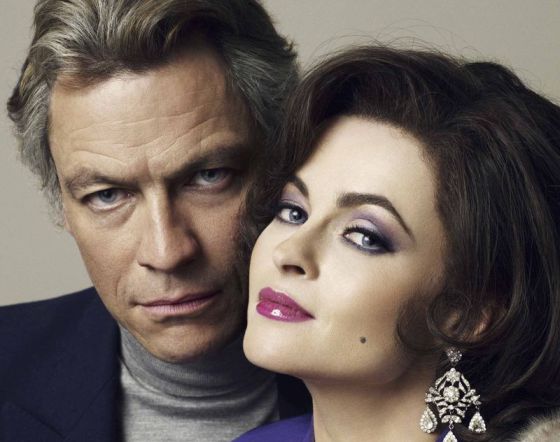In the final scene of Burton and Taylor, the BBC’s recent television film about Richard Burton and Elizabeth Taylor, the pair share a mournful tête-a-tête in Taylor’s dressing room. “We’re addicts Elizabeth, you and I,” he says. “Love is not a drug,” she counters, wearily. “Isn’t it? I don’t know,” he replies.
Burton and Taylor takes one of the most glamorous love affairs Hollywood has ever known and pares it down to a self-destructive obsession between two broken, battered people. Which is fine, admirable even- except that it is such a slog to watch.
It’s 1983 and Richard Burton (Dominic West) and Elizabeth Taylor (Helena Bonham-Carter) are about to appear in a Broadway revival of Noël Coward’s Private Lives. Twice married and twice divorced, their on-stage reunion (in a play about divorcees rediscovering their love, no less) is the most anticipated event of the season. But trouble is brewing behind the scenes. Already wary about working with her, Burton is infuriated when Taylor turns up late for rehearsals and hasn’t even read the play. Worse, she seems more interested in him than in the production. How can he convince her that he has no intention of rekindling their relationship?
I was rather sceptical about this film. Lifetime has already foisted the embarrassing Liz & Dick on the world (complete with a rasping Lindsay Lohan), and despite the BBC stamp of approval, I was afraid Burton and Taylor would be more of the same. It wasn’t the garish wreck I had expected, but that’s scant praise.
Every biopic stands or falls on the strength of its impersonations. The brilliant: Robert Downey Jr. in Chaplin. The bad: Jennifer Love Hewitt in The Audrey Hepburn Story. And the best forgotten: James Brolin and Jill Clayburgh as Gable and Lombard. So, do West and Bonham-Carter look like Burton and Taylor? No. Do they sound like them? Sometimes. West drops his voice an octave and Bonham-Carter comes up with a breathy approximation of Taylor’s light, thin voice. Yet the overall effect is far from convincing. There’s a reason Taylor and Burton are iconic: to some degree, they are inimitable.
Still, this is a film less interested in icons and more in flawed people. Bonham-Carter plays Taylor as a wounded child: passionate, mercurial and spoiled rotten. Although surrounded by a coterie of hangers-on who cater to her every whim, she still feels isolated and pines for her one great love. No matter that he has happily made a new life for himself without her: all Taylor needs to do is get him back and Burton will make everything better. She cajoles him into doing the play and at their first rehearsal, gives him a few nudges in the right direction: an expensive scarf and the offer of lunch at Sardi’s. But Burton turns her down (he’s made plans with his girlfriend, Sally) and Taylor is left adrift in an empty room. Increasingly frustrated and insecure, she takes pills that make her feel woozy, and is an unpredictable mess in rehearsals before pulling herself together by opening night. The mercifully cheerful late-night supper that follows ends in ruins, when Taylor realizes Burton isn’t wooing her- he’s giving her notes on her performance. “Where is my Anthony?” she growls, storming out into a haze of flashbulbs.
I found myself asking the same question. As Burton, West is at his best in scenes which showcase Burton’s dry wit (when Taylor is late for a performance, he tells the crew to get the kettle on, and asks for sleeping bags and the Times crossword puzzle) but doesn’t know how to handle his Byronic temperament. Burton’s diaries reveal he was a perceptive, passionate and, happily in an actor, deeply poetic human being. West barely demonstrates any of this- he’s too busy being gloomy.
Burton knows Taylor is falling apart and he has neither the time, nor the patience to pick up the pieces. So, for the sake of his sanity, he marries Sally.
Taylor is unhappy.
Watching their working relationship deteriorate is farcical and sad: Taylor mugs to the audience, mockingly walks onstage with a parrot and actually hits Burton in a fight scene. He shows almost saintly forbearance and tries to prod her into professionalism. She spends a lot of time sobbing; he takes long walks across town, alone, in the dark.
There are a handful of scenes which work, such as Taylor’s first entrance onstage, where she commands rapturous applause from a packed crowd simply by standing under the spotlight and breathing. But it’s a bad sign when you realize you are watching the film for the same reason much of the original Broadway audience saw the play: to gawk.
Like its central performances, Burton and Taylor crackles and flares, but sadly never really bursts into life.

Leave a Reply